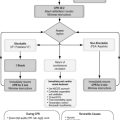Chapter 51. Trauma in pregnancy
The approach to the pregnant trauma victim is exactly the same as for the non-pregnant trauma victim, except that there are two patients – mother and fetus – to consider.
The mother is treated directly, the fetus is treated indirectly by optimum resuscitation of the mother. The best chance for the fetus is optimum resuscitation of the mother.
Because the mother has reduced oxygen reserves, the spontaneously breathing pregnant trauma victim must always receive oxygen at as high a concentration as possible, preferably close to 100%, via a reservoir face mask.
Always administer high-flow oxygen
The approach to the pregnant trauma victim
The ‘SAFE’ approach and immediate management of life-threatening injuries is the same for all trauma patients.
Maternal clinical signs of hypovolaemia and haemorrhage present too late to save the fetus in 80% of cases so maintain a high index of suspicion. Treatment precedes formal diagnosis.
If there is ANY possibility of significant trauma immediate evacuation is essential
• High flow oxygen should be applied immediately or early intubation if unconscious
• Position the patient for relief of vena caval compression
• Do not attempt formal examination of the perineum, however do try and check for bleeding or fluid loss from this area
• An attempt should be made to palpate the abdomen, checking for fetal parts, movements and the fetal heart rate if possible. Undue time must not be wasted on this part of the assessment
• Evacuate rapidly to hospital.
Consequences of trauma in pregnancy
• A pregnant woman sustaining any trauma to the abdomen and pelvis, however minor, requires specialist assessment and observation at hospital
• Even small degrees of abdominal trauma can cause the maternal circulation to be contaminated by fetal red blood cells. As a consequence, maternal antibody formation against fetal red cells may result in fetal anaemia and problems with future pregnancies.
Blunt trauma
• Blunt trauma to the abdomen and pelvis is more common than penetrating trauma in UK practice, and in the pregnant woman is most often caused by:
1. Road traffic collisions
2. Falls
3. Assaults
• The three most common pathological mechanisms in blunt abdomino-pelvic trauma in the pregnant mother are:
1. Placental abruption
2. Uterine rupture
3. Pelvic fracture
• In each, both mother and fetus may die from unrecognised, often concealed, hypovolaemic shock resulting from haemorrhage.
Placental abruption
• Placental abruption occurs in as many as 5% of episodes of minor trauma and 50% of major trauma cases, and can present up to 48 hours after trauma
• Direct trauma to the abdominal wall transmitted to the uterus, or deceleration forces applied to the body as a whole causes the placenta to shear off the uterine wall
• Haemorrhage occurs between the placenta and the uterine wall and may be concealed or revealed (per vaginam)
• Premature labour may be precipitated by placental abruption.
Uterine rupture
• Uterine rupture requires considerable direct force and will almost inevitably be associated with other life-threatening injuries
• Signs of uterine rupture include maternal shock, fetal bradycardia (or absence of fetal heart sounds) and obvious palpable fetal parts on abdominal examination. There may or may not be vaginal bleeding or abdominal pain.
Pelvic fracture
• Internal bleeding from pelvic fractures is difficult to control
• The usual causes of pelvic fractures are falls from a height and road traffic accidents
• The signs are those of massive or progressive maternal haemorrhagic shock
• Apply a pelvic splint, taking care not to compress the abdomen
• Copious IV fluids will be indicated in order to prevent or reduce maternal hypotension.
There must be no delays in getting to hospital
Penetrating trauma
• In the UK, stab wounds are more common than gunshot wounds
• The usual outcome in significant abdominal injuries is fetal death with maternal survival
• The approach is the same as for the non-pregnant woman, with a continuous watch for concealed haemorrhage and the possibility of time-critical but concealed injury to other organs
• Attention to ABC and rapid transport are essential.
Burns
• The management of pregnant patients with burns is exactly the same as for non-pregnant patients, except that they must be taken to a facility where caesarean section can be performed. Once the patient is removed to a safe environment the use of humidified oxygen and early intubation are essential
• Because of the metabolic and fluid requirements of the pregnant and burnt woman, delivery by caesarean section is often the only option
• The mortality rates in pregnant women depend on the body surface area burnt: in those with burns of 33–66% of body surface area, survival will depend crucially on the early management of hypoxia and hypovolaemia.
Summary
• Haemorrhage is frequently concealed in the pregnant victim and hypovolaemic shock is inevitably severe once the signs manifest
• Intravenous fluid therapy should aim to avoid the development of maternal hypotension
• Failure to relieve vena caval-compression can kill both mother and fetus
• The pregnant trauma victim should always be considered to have time-critical injuries and be transported to a surgical facility quickly
• Obstetric and gynaecological diagnoses need not be made in the field.
For further information, see Ch. 52 in Emergency Care: A Textbook for Paramedics.



